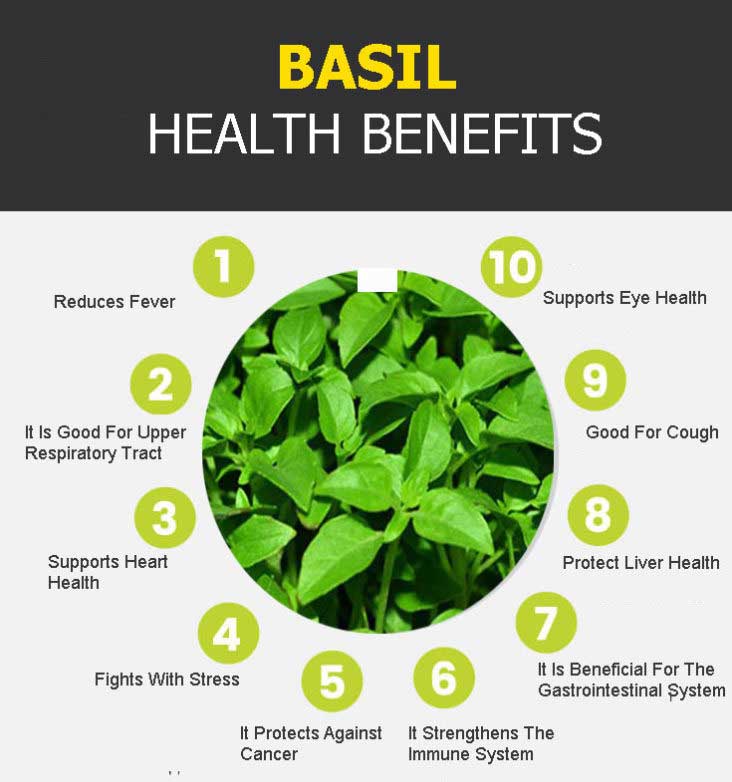Basil is one of the most popular and most effective herbal foods in terms of Health. It is also known as a Basil or Holy Basil in many cultures all over the world. The Latin name of the Basil Belonging to Lamiaceae family is known as locum basilicum.
What Are The Benefits Of Basil?
It has been used for medical purposes for years. The fact that the germs have lethal and disinfectant properties makes it a very useful herb.
Basil leaves have antibacterial, antioxidant, and anti-inflammatory properties that can treat various health problems ranging from heart disease to respiratory problems. It is also high in many essential nutrients and minerals.

Top 18 Benefits Of Basil’s Health
Reduces Fever
It has healing powers due to the essential oils it contains. It works as an excellent antibiotic, antiseptic, anti-fungus and disinfectant and protects the body from infections. High fever in the body mainly due to protozoa (malaria), infections, bacteria (typhoid), viruses (influenza) and even allergic substances and fungi.
It is an indicator of the body’s struggle against these situations. When basil leaves are boiled and drunk, It reduces the fever in support of the fight against infections.
Good For Upper Respiratory Tract
Basil virus, bacteria, and fungal infections treatment along with the respiratory system reduces congestion.
With the presence of elements such as Kamen, cineol, it exhibits an extraordinary ability. In this case, it can be effective in almost all respiratory disorders, including chronic acute and bronchitis.
Supports Heart Health
It is one of the plants that are beneficial for heart health. It lowers cholesterol levels and prevents stroke and heart defects. At the same time, vitamin C can fight free radicals because it contains antioxidants.
According to some studies, the basil can greatly reduce blood sugar levels as well. Thus, it can prevent the risk of heart disease.
Fights With Stress
It is not only good for physical ailments but also good for Mental Health. It calms nerves so that they can relax in situations like tension and depression.
It is rich in potassium, which can relax the blood vessels that are stretched. For this reason, it may be useful to chew rye to keep away from the stress of the day.
Protects Against Cancer
It is known to be an effective antioxidant. It can protect the body against the damage of free radicals because it is effective against many types of cancer.
Basil can also protect cell structures from oxygen-based damage as well as radiation because it contains flavonoids. Basil can also protect the cells as a support for the production of beta carotene.

Strengthens The Immune System
In addition to supporting the metabolism due to the antioxidants it has, basil can also protect against infectious diseases by its antibacterial oil that it contains in its leaves. Topical basil leaves can also be applied to help fight viral infections including colds, flu, and herpes.
Beneficial For The Gastrointestinal System
It is also known as a powerful anti-inflammatory. It also helps to treat symptoms of digestive disorders such as inflammatory bowel disease (IBD), digestive difficulties, stomach gas, stomach cramps, and constipation while promoting the proper functioning of the gastrointestinal system. It depends on a substance called eugenol, in which the basil acts as an anti-inflammatory agent.
Protect Liver Health
Hepatitis C is a liver disease caused by the hepatitis C virus (HCV), which is found in the blood of persons who have the disease.
According to a study published in 2009, basil contains compounds that may be protective against oxidative stress on the liver. Basil extract is useful for removing toxins in the blood, improving metabolism and eliminating liver diseases and maintaining healthy liver functions.
Good For Cough
It is a plant used in cough syrup. But instead, it would be better to buy and consume. When a glass of water is boiled with eight basil leaves and five carnations, 10 minutes, you will make a good cough tea. When you drink after cooling it will relieve a sore throat. You can also use it as a mouthwash.
Supports Eye Health
Only 100 grams of basil is a good source of vitamin A, which is needed daily. Thanks to its antioxidant properties, basil can help to prevent eye disorders such as night blindness.
Good For Kidney Health
It can strengthen the functioning of the kidney. To improve the functioning of the general kidney, it may be useful to consume basil leaves.
If you have a kidney stone, you are likely to develop more stones. Kidney stones form when there is a decrease in urine volume or an excess of stone-forming substances in the urine.
Antibacterial
Thoroughly washed fresh basil leaves cause food poisoning due to essential oils E. it can be a completely natural way to reduce bacteria such as coli and Listeria.
Struggles With Inflammation
It can help prevent the enzyme cyclooxygenase (Cox) in the body because it contains Eugene. Anti-inflammatory drugs such as aspirin and ibuprofen used for Cox are formulated to block this enzyme.
Diabetes Is Good
People with type 2 diabetes may be able to control their blood sugar levels. Pre-studies have shown that the basil can keep blood sugar levels under control.
If you are taking medicines that lower your blood sugar, it is important to be careful about the consumption of rehydration. Because basil also lowers blood sugar levels.
Supports Healthy Stomach
Stress can disturb your stomach. This condition can contribute to acid reflux and ulcers. However, basil has anti-ulcer properties. Therefore, it not only reduces stomach acid but also increases protective mucus production.
Prevents Bad Breath
Bad breath can be harmful to self-confidence. It is important to remember that dental care is the best way to prevent tooth decay and gum disease. If you suffer from bad breath, you can prevent this by chewing a handful of basil leaves.
Relieves Pain
This plant acts as a COX-2 inhibitor and can be useful for people with painful medical conditions. Some compounds found in the basil is act as inflammatories and can help to alleviate neurological pain. It is also used to treat ulcers, cuts, and wounds, especially since it is antiseptic.
Read Next: 9 Natural Ear Pain Remedies for Instant Relief (Quick&Easy Prep)
Promotes Skin Health
Basil leaves by removing toxins and purifying blood to prevent acne and acne eruption. Because these leaves are both antifungal and antibacterial, they support skin health by preventing inflammation.
Damages Of Basil
1.) When consumed with proper amounts of food through the mouth, basil is considered safe.
2.) It is considered to be safe for healthy adults when consumed for a short period for treatment by mouth.
3.) When used for long-term treatment, basil is not safe. Some people may cause low blood sugar.
4.) It contains estragole chemicals that increase the risk of developing liver cancer.
Pregnancy And Lactation: Considered safe for pregnant and nursing women when consumed in quantities of food. However, large amounts of consumption are not safe.
Children: It is safe for children when consumed in food quantities. However, large amounts of consumption are not recommended.
Bleeding Disorders: These oils and extracts reduce blood clotting can cause bleeding. In theory, basil can make bleeding disorders worse.
Low Blood Pressure, In Theory, basil extracts can make the condition worse in people with low blood pressure.
Surgery: Basil oils and extracts reduce blood clotting in theory, during surgical procedures may increase the risk of bleeding. At least two weeks before scheduled surgery, basil consumption should be stopped.
Recommendations
1.) Make sure that there is no pesticide on the basil leaves that are thoroughly washed with cold water.
2.) In general, to ensure that the smell and taste of the food are not disturbed, basil is added when the food is almost cooked.
3.) Fresh basil leaves add flavor by adding vegetables, poultry or meat.
4.) This plant is also used in tomato and egg dishes, soups and salads.
5.) Fresh or dried basil leaf is used to prepare soup and dishes.
6.) Chopped fresh basil leaves can be added to fruit salads as well as giving vegetables rich.
There is no clear limitation on the quantity of daily consumption of the store. According to a clinical trial for hypoglycemic effect, 2.5 g dried powder basil 200 ml of water may be used daily for up to 2 months.
You can drink 2-3 glasses of basil tea a day. After each meal, it is recommended to drink a glass of basil tea. Thus tea becomes very effective for intestinal colics, gastritis ulcer, anorexia, urinary tract infection, diarrhea.
